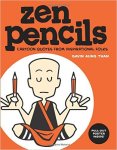Tangential talk is the best part about sharing books- one writer leads to a story to another writer to another story. There’s a randomness that happens when each person in a group talks about a book that has affected him.
We saw in Part 1 that expert advice could go wrong. In fact data interpretation is the challenge of the hour. Something as elusive as an observation can affect the outcome. “That’s kind of like science fiction.” Sudharshan from Vantage Circle opined.
Which brings us to the science fiction read of the party.
Kumar. S, Architect at IBM, believes that as far as science fiction goes the most challenging book of all has to be the
Neuromancer, compared to which a movie like Matrix is simple fare.
 He came upon a book called The Martian, a 2011 science fiction novel by Andy Weir, also adapted as a movie starring Matt Damon. “It’s pure science fiction, but what I couldn’t understand is how the protagonist handled loneliness. There’s no mention of this challenge in the book at all.”
He came upon a book called The Martian, a 2011 science fiction novel by Andy Weir, also adapted as a movie starring Matt Damon. “It’s pure science fiction, but what I couldn’t understand is how the protagonist handled loneliness. There’s no mention of this challenge in the book at all.”
Loneliness is not to be taken lightly. Ralph talked about how there were so many nonagenrians who were too healthy to die but wanted to nonetheless. Umakant mentioned that this would be the next biggest challenge of growing life expectancy. Machines would be the new solace- science fiction is already posed to become a part of the everyday life of the old and the ignored.
 Harris Ibrahim K.V, Python Tamer at Eventifier, delighted in Charlie and the Chocolate Factory by Roald Dahl. He found the poetry in the book delightful and quite a departure from the sombre horror of Dahl’s short stories. Dahl’s reputation is colorful to say the least. He served in the Royal Air Force during World War and even worked as a spy. You might want to have a look at this.
Harris Ibrahim K.V, Python Tamer at Eventifier, delighted in Charlie and the Chocolate Factory by Roald Dahl. He found the poetry in the book delightful and quite a departure from the sombre horror of Dahl’s short stories. Dahl’s reputation is colorful to say the least. He served in the Royal Air Force during World War and even worked as a spy. You might want to have a look at this.
Unfortunately the movie failed to move him,as movies often fail their book counterparts. “If there is a movie that does justice to the books, it must be The Lord of the Rings.” But here again, some readers debated over the genuineness of Aragon being lost on the silver screen.
 “Not to mention how deeply hurt I was by Voldemort of the Harry Potter series. The sense of doom about him was absent- he was almost (dare I say it?) comic,” Abhaya said.
“Not to mention how deeply hurt I was by Voldemort of the Harry Potter series. The sense of doom about him was absent- he was almost (dare I say it?) comic,” Abhaya said.
Harris Ibrahim was not the only one who read Dahl. A young reader, Eshwar, spoke about James and the Giant Peach by Roald Dahl that he considered the best book he had ever read. The story line is so tempting- a boy loses his idylllic existence and escapes from the tyranny of his evil aunts with fruitly intervention- you want to read it straight away.
More books were shared. We’ll talk about these in Part 3.
 SBR: The book Old Paths White Clouds is a confusing experience. With a subtitle like Walking in the Footsteps of the Buddha, you would think it is some kind of travelogue through Buddhist landmarks, but it is not so. It is categorized on the cover as a Biography. What I found it really to be was a work of historical fiction based on the life of Buddha. But unlike regular historical fiction, it makes no attempts at making the story relatable and interesting. It consists of one sermon after the other, punctuated by some miracles and is full of unbelievably devout people. It is supposed to be read as the biography of Buddha by those who already believe in the current Buddhist lore or have a predisposition towards it. Not surprisingly the book bored me to the hilt. But I read it through the end because I was trying to learn more about Buddha at that point of time and it is a good collection of stories that Buddhist tradition believes about him.
SBR: The book Old Paths White Clouds is a confusing experience. With a subtitle like Walking in the Footsteps of the Buddha, you would think it is some kind of travelogue through Buddhist landmarks, but it is not so. It is categorized on the cover as a Biography. What I found it really to be was a work of historical fiction based on the life of Buddha. But unlike regular historical fiction, it makes no attempts at making the story relatable and interesting. It consists of one sermon after the other, punctuated by some miracles and is full of unbelievably devout people. It is supposed to be read as the biography of Buddha by those who already believe in the current Buddhist lore or have a predisposition towards it. Not surprisingly the book bored me to the hilt. But I read it through the end because I was trying to learn more about Buddha at that point of time and it is a good collection of stories that Buddhist tradition believes about him.
 Umakant Soni, Director at Science Incorporated, read
Umakant Soni, Director at Science Incorporated, read  Abhaya read an interesting book called
Abhaya read an interesting book called  Just when I thought that all the books discussed were utterly disconnected, Sanjana Kumar, an endodontist, talked about book called
Just when I thought that all the books discussed were utterly disconnected, Sanjana Kumar, an endodontist, talked about book called 
 J Vignesh, journalist from The Economic Times, held a precious book of a genre we have so far never come across in our BYOB Parties or Talking Terrace Book Club meets–
J Vignesh, journalist from The Economic Times, held a precious book of a genre we have so far never come across in our BYOB Parties or Talking Terrace Book Club meets–  Shruti Garodia, a content writer, spoke about Khaled Hosseini’s books-
Shruti Garodia, a content writer, spoke about Khaled Hosseini’s books-  Sudharshan Narayanan from Vantage Circle delved into the mystery genre this time and he enjoyed
Sudharshan Narayanan from Vantage Circle delved into the mystery genre this time and he enjoyed  He came upon a book called
He came upon a book called  Harris Ibrahim K.V, Python Tamer at Eventifier, delighted in
Harris Ibrahim K.V, Python Tamer at Eventifier, delighted in  “Not to mention how deeply hurt I was by Voldemort of the Harry Potter series. The sense of doom about him was absent- he was almost (dare I say it?) comic,” Abhaya said.
“Not to mention how deeply hurt I was by Voldemort of the Harry Potter series. The sense of doom about him was absent- he was almost (dare I say it?) comic,” Abhaya said. This time, the BYOB party welcomed an overwhelmingly large number of individuals who work in the software space.
This time, the BYOB party welcomed an overwhelmingly large number of individuals who work in the software space. Ralph A decided to skip the self-help and talk about a very tech book called
Ralph A decided to skip the self-help and talk about a very tech book called  I talked about Dorothea Brande’s book
I talked about Dorothea Brande’s book  Jaseem Abid, a platform engineer at Fybr, talked about his taste for more simple books. He read the
Jaseem Abid, a platform engineer at Fybr, talked about his taste for more simple books. He read the  To end the debate, Abhaya mentioned a book called
To end the debate, Abhaya mentioned a book called 

